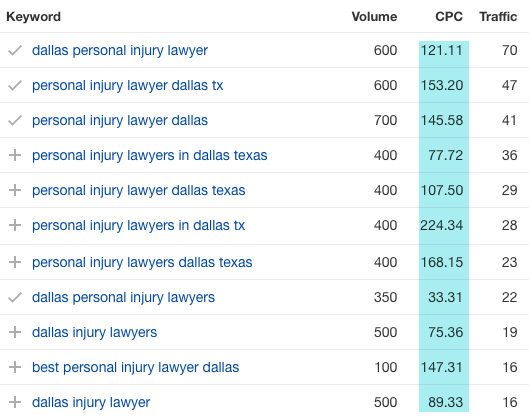Pay-per-click advertising on Google can be an effective way for law firms to generate new clients. It can also be a good way for lawyers to shovel large amounts of cash directly into Google’s coffers and walk away without anything to show for it.
It is not at all uncommon for valuable legal keywords to cost hundreds of dollars per click. For example, check out the estimated cost per click for this group of Dallas personal injury keywords:

With per-click prices reaching into the hundreds of dollars in some legal practice areas, it’s easy to see how law firms can get absolutely torched on their PPC investment if they don’t get the basics right.
In this post I’ve shared 10 tips to help you avoid turning your ad dollars to ash, maximizing the return you realize from your investment in PPC instead.
10 Expert Insights to Get the Most Out of Your Law Firm’s PPC Investment
Simplify your account structure
Structuring your law firm PPC account correctly is the best way to ensure you are getting the most for your budget. A simplified campaign structure is not only easy to manage but provides the best results.
Ideally, your account should only have 1 search campaign that contains multiple ad groups for different keywords and landing pages.
Separate campaigns should only be created if you want to target:
- specific/different location
- dedicated budget for specific keywords
- different campaign types (display, performance max, etc.)
Example of how your account could look:
Campaign #1
Location Target = West Texas
- Ad Group 1 – Truck Accidents
- Ad Group 2 – Oil Field Accidents
- Ad Group 3 – Dram Shop Claims
Campaign #2
Location Target = Houston
- Ad Group 1 – Injury
- Ad Group 2 – Accident
- Ad Group 3 – Branded
Campaign #3
Display Campaign
Campaign #4
Dedicated Budget for Mass Tort Campaign
Only show your ad to people physically in your target location
It’s all about location. This is true in real estate and in PPC for lawyers. Your campaigns should have the target location option set to:
Reach people in or regularly in your targeted locations (Presence). This option lets you show your ads to people who are likely to be located, or regularly located in the locations you’ve targeted.
Source
By default, when you start your law firm PPC campaign, Google will set your location target option to Presence or Interest.
With this default setting, your ad will be shown to people whom Google deems as having an interest in your area, but not physically in your target location. While this may sound good in theory, it can result in a lot of “bad” clicks that eat away at your budget. While not 100% foolproof, the Presence option helps cut down on any out-of-location leads.
Only use Exact and Phrase Match keyword targeting
In 2021, Google changed the way keyword match types function. Phrase and Exact match became a lot more lenient and the intent of the searcher was taken into consideration as opposed to only going off of exactly what the user typed.
For example, before 2021, if you were bidding on the exact match keyword [personal injury lawyer] your ad would have only shown up for people who typed “personal injury lawyer”. Now, with that same exact match keyword, your ad will trigger even if someone types in “personal injuries lawyer” “personal injury attorneys” or “law firm for personal injury.” So you don’t have to worry about missing out on valid searches.
Google really really wants you to use broad match and is going to recommend it to you with every campaign improvement suggestion. You can also find a lot of articles on how the new broad match paired with smart bidding is a good choice. While that may be true for some industries, we have never seen this work for law firm PPC. What you usually end up with is completely generic phrases like “law firm” and a lot of wasted clicks.
Our advice, stick with Exact and Phrase Match for your keywords, no matter how many times Google asks you to switch.
Use smart bidding
Automation is taking over Google. And while you do not want to give up full control, you should let Google help you where it can.
Smart Bidding lets Google take all the data and signals it is receiving from your campaign and automatically optimize it for better results. It is something that is impossible to manually replicate, so it is best to let Google do the work for you.
In our experience, Target CPA has worked best for lawyer PPC accounts that get a lot of impressions and Maximize Conversions has worked best for low impression campaigns. Keep in mind that both these strategies will take time to work. Google needs lots of data and that can mean your campaign will need to be running for 3-months before it can start performing at an optimal level.
Create Response Search Ads that Google will serve
Responsive Search Ads (RSAs) are the only type of text ads that Google will allow you to create for search campaigns. Unlike the old extended text ads, RSAs are designed to let Google cycle through a bunch of different ad copy and automatically serve the best ads for your audience.
When creating your RSAs you should fill out all 15 headlines, four descriptions, and use a minimal amount of pinning. This will signal to Google that it needs to serve your ad to more people at a quicker pace to figure out the best-performing combinations.
Here are some specific tips to help you create an effective RSA:
- use unique headlines
- use keywords in some headlines but not all
- use both short and long headlines
- use calls to action in some headlines but not all
- don’t be afraid to try something new
Track all leads in Google Ads
The only way to not only understand the performance of your attorney PPC campaign – but to maximize positive results as well – is to track all of the leads that your ads are generating. This includes emails, phone calls, chats, and any other way that potential new clients contact you.
This is essential data that Google needs to optimize your campaign. Without a full picture of the leads you are receiving, you will never be able to fully optimize your campaign for success. Feed the Google machine and you will be rewarded.
Pro Tip: A tool like CallRail will automatically import data to and from Google Ads and allow you to track quality and value. All these metrics will only help you get higher-value leads from your PPC.
Don’t only use fully automated campaigns
While you want to let Google help you where it can, using fully automated campaigns such as Performance Max, should be done with caution. Google makes these campaigns very easy to set up and run, but you have very little control over where your ad shows and what keywords you are bidding on. This could mean getting a bunch of leads for non-targeted services.
If you would like to use an automated campaign like Performance Max it is best done as an accompaniment to Search campaigns.
A few things to note if you are running both campaigns:
- If the user’s query is identical to an eligible Search keyword of any match type in your account, the Search campaign will be prioritized over Performance Max.
- If the query is not identical to an eligible Search keyword, the campaign or ad with the highest Ad Rank, which considers creative relevance and performance, will be selected.
Don’t auto-apply recommendations
Google likes to give you a lot of suggestions on how to improve your campaign (please see the paragraph on broad match). 90% of the time, these suggestions do not make sense for law firm PPC and will not improve your performance.
You should never blindly apply Google’s recommendations to your campaigns. Always click view recommendations and decide for yourself if the changes make sense based on the specifics of your services and your goals.
Examples of recommendations you can ignore
- Upgrade your existing keywords to broad match
- Reach additional customers on partner sites
- Add lead form ads to get more leads (unless you have a CRM where these leads can be imported)
Examples of recommendations you may want to consider after viewing the recommendation
- Make your account easier to manage by removing non-serving keywords
- Remove redundant keywords
- Add new keywords
- Adjust your CPA targets
- Improve your responsive search ads
- Improve your responsive display ads
Keep an up-to-date Account-level negative keyword list
Every PPC campaign will generate some unwanted keywords, but you don’t want to waste a large number of clicks or impressions on undesirable, irrelevant keywords.
You should regularly check your search terms and add any “bad” keywords to your Account-level negative keyword list. You will also want to add all states and major cities that you can’t serve. This will keep your ads from being served to people located in your target area who are searching for services in another city or state.
Set a realistic budget
PPC for law firms is expensive and not having a realistic monthly budget is the #1 problem that hampers campaign success. If you don’t have a healthy budget you are never going to get enough leads to turn into signed cases. You will basically be flushing money down the drain.
Personal Injury keywords are some of the most expensive keywords on Google Ads. We have seen some keywords in large markets that can cost $1,000 per click! That is just for a click, not a lead.
To figure out a realistic monthly budget use the keyword planner to see the average cost per click to be at the top of the page on keywords in your target location. You can assume that ~20% of clicks will turn into leads. If the average CPC is $150, a budget of $2,000 will only get you 13 clicks, which means 2–3 leads total for the month. Any budget that is getting you under 10 leads a month is not worth your time.
I hope you found these tips useful and feel empowered to go out and optimize your law firm’s PPC campaigns. If you’d like another set of eyes on your ad setup, don’t hesitate to reach out to us for a strategy review.
